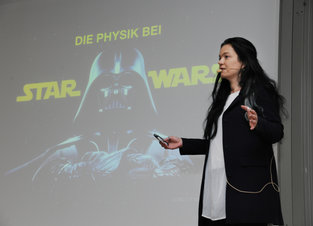GSI and FAIR are convinced that every entrepreneurial and scientific activity should go hand in hand with high ethical standards. As an example of this, GSI and FAIR are continuously working to fulfil their responsibility to respect human rights in their own sphere of influence.
GSI and FAIR are aware of their social purpose in terms of knowledge transfer and dialogue with society and industry. GSI and FAIR have been organising the public lecture series " Wissenschaft für Alle" since 1988, which is aimed at anyone interested in current science and research.
Human rights include civil and political rights as well as economic, social and cultural rights. They are interdependent and mutually reinforcing. Human rights are universal, even if they are not equally realised in all parts of the world.
The topic of business and human rights is highly relevant. In general, companies can have positive or negative impacts on human rights, such as
- Positive: job creation, economic and social development, infrastructure, diversity
- Negative: child labour, forced labour, environmental pollution, corruption, discrimination
GSI and FAIR face the challenge of using suitable instruments to implement and enforce human rights standards in a globalised economy. It is important to GSI and FAIR to increase the positive corporate contribution and to prevent or minimise negative impacts. GSI and FAIR are aware that an active approach to respecting human rights helps to avoid risks and open up opportunities.
The focus at GSI and FAIR is on the implementation of legal requirements relating to human rights. Since 2024, GSI and FAIR have been affected by the German Supply Chain Due Diligence Act (LkSG). According to the LkSG, GSI and FAIR are obliged to adequately observe the human rights and environmental due diligence obligations defined in their business area and supply chains. In order to comply with these obligations, GSI and FAIR define processes to identify, minimise and prevent human rights and environmental risks in their own business operations and at suppliers.
GSI and FAIR have defined clear responsibilities for the appropriate fulfilment of human rights and environmental due diligence obligations throughout the supply chains in accordance with the LkSG.
Further information can be found on the GSI website on the LkSG.
Sustainability-related issues, such as climate and environmental protection, compliance with labour and social standards and the protection of human rights, are becoming increasingly important. Procurement in particular can make a significant contribution to this. By taking sustainability criteria into account in the procurement process, so-called "more sustainable procurement" contributes to the improvement of labour, social and environmental standards. At the same time, the demand for more sustainable products and services promotes the supply of these.
For GSI and FAIR, the alignment of their procurement practices with a view to achieving a positive contribution to human and labour rights, environmental obligations or fair operating and business practices represents a fundamental contribution to the sustainable development of the research institute.
Sustainability criteria are already being incorporated into procurement for GSI and FAIR, as shown by the purchase of green electricity, for example. In order to have clear and transparent procurement guidelines, the process of integrating sustainability into the research institute's procurement practices was initiated at GSI and FAIR this year, with GSI and FAIR using the guidelines and methods of the international standard ISO 20400 - Sustainable Procurement - alongside LeNa and the SDGs to draw up procurement guidelines.
For more than 35 years, GSI has been communicating complex scientific topics to a broad audience in an understandable, vivid and interactive way as part of its public lecture series.
The monthly science and research exchange offers both young and old exciting insights into the research of GSI and FAIR as well as into urgent and current topics from physics, chemistry, biology, mathematics, medicine and informatics. The purpose is to make scientific phenomena understandable such as the recently detected gravitational waves, physical experiments with particle accelerators, medical therapy with particle beams and quantum physical phenomena.
With this lecture series, GSI and FAIR inform the scientifically interested public about developments as well as the newly gained knowledge and involve the audience in the scientific and research processes.
With the help of live demonstrations and experimental lectures, research becomes tangible and understandable for everyone. This strengthens the mutual exchange and dialogue and achieves a better mutual understanding between science and society.
Knowledge transfer plays a key role in efforts to achieve sustainable development with regard to the social dimension.
Contact

Sustainability Manager GSI and FAIR
Jan Lindenberg
Phone: +49 6159 71 1381
E-Mail: nachhaltigkeit(at)gsi.de

Human Rights Officer
Pia Geppert
Phone: +49 6159 71 3641
E-Mail: lieferkettengesetz(at)gsi.de
Short-URL Website: https://www.gsi.de/lksg













